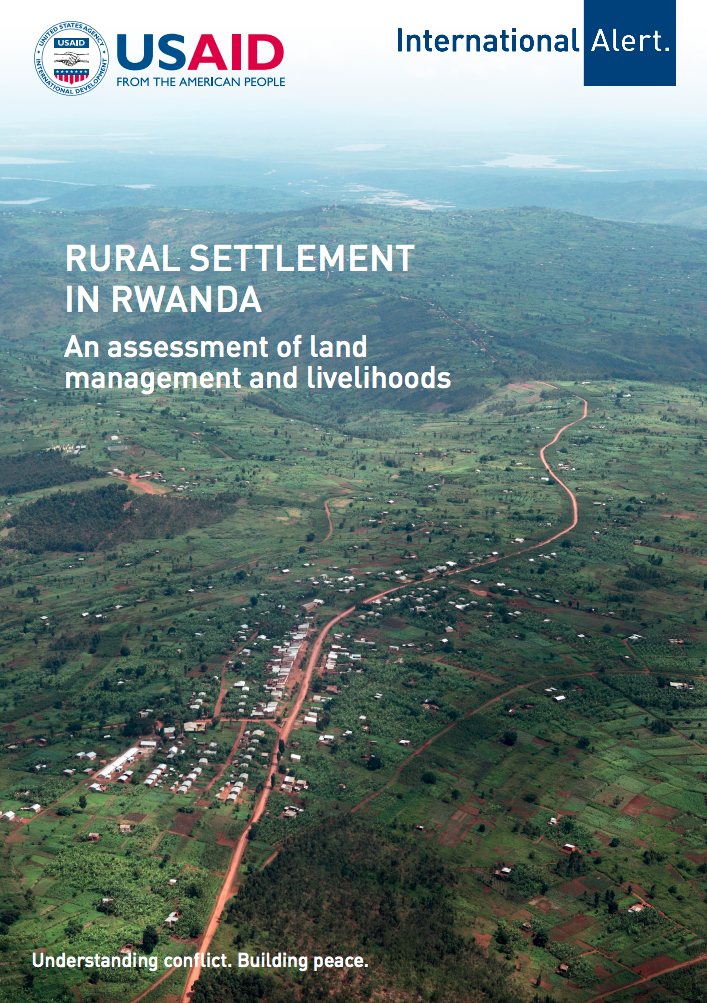Location
We are one of the world’s leading peacebuilding organisations, with 30 years of experience laying the foundations for peace.
We work with local people in over 25 countries around the world to help them build peace, and we advise governments, organisations and companies on how to support peace.
We focus on issues that influence peace, including governance, economics, gender relations, social development, climate change, and the role of businesses and international organisations in high-risk places.
We work in Africa, south and southeast Asia, central Asia, the South Caucasus, Europe, Latin America, and the Middle East and north Africa, and have 18 offices around the world.
We believe peace is possible when people can live in safety, have fair and effective laws, participate in shaping political decisions, make a decent living and secure their wellbeing.
Members:
Resources
Displaying 1 - 5 of 9Decision-Making and Joint Control Rights over Land in Rwanda
Report explores and analyses community perceptions of the obstacles facing women’s participation in decision-making about jointly held land. Also examines the factors that prevent women from participating in community-level decision-making structures, specifically those related to land. Conducted in 4 districts of Rwanda: Ngororero and Rutsiro (Western Province), Huye (Southern Province) and Ngoma (Eastern Province).
Rural Settlement in Rwanda: An assessment of land management and livelihoods.
Residential land in Rwanda is scarce due to hilly terrain, a high population and a focus on agricultural growth to address food security concerns. The situation worsened following the 1994 genocide against the Tutsi, which led to extensive destruction of houses and infrastructure, leading to thousands of Rwandans becoming homeless. To address these concerns, the government embarked upon a resettlement programme to regroup people into planned residential areas, ‘imidugudu’, the aim of which is to provide improved quality of life for the population through the provision of basic needs.
The Need for Conflict-Sensitive Land Policy and Land Governance in Africa
Includes land and violent conflict in Africa; land policy in conflict-affected or conflict-prone contexts; key elements of conflict-sensitive land policy; the framework and guidelines for land policy in Africa; role of the different actors; conclusions and recommendations.
Land, Power and Identity: Roots of violent conflict in Eastern DRC
Identifies disputed control over land as a root cause of conflict in Eastern DRC. Focuses on conflicts between customary and state-run land tenure systems, and claims by some communities to ‘indigenous’ status which are used to relegate others to ‘migrant’ or ‘foreigner’ status. Waves of population displacement have created overlapping claims to land, and an ongoing process of refugee return is currently increasing tensions over these claims in parts of Eastern DRC. Examines efforts to manage this return process and offers recommendations for action by local and international actors.
Land Rights in Liberia: equitable access to land for the poor and marginalised
General
The action is a response to the call to strengthen service delivery by civil society organisations (CSOs) to improve legal certainty and enforcement of land rights for women and youth in Liberia. Land tenure in Liberia is key in the fight against poverty and food insecurity as over 40% of the population relies on subsistence farming for their livelihood . The lack of access and insecurity of land tenure is a major problem in Liberia. Recent government policy is making endeavours to remedy the issue through legislative reforms, for example, the Land Rights Policy of 2013 has introduced the concept of customary rights in Liberia while the Inheritance Laws support the rights of women to husbands’ property including land. The Land Rights Act is another important legal framework that distinctly established the legal framework and land categories and title in Liberia; when passed into law and fully implemented, it will provide opportunities for rural communities to own their land through registered titles. However, these legal frameworks have not fundamentally changed the situation especially for women and youth. Although women and men have the right to land ownership under the statutory and customary tenure, access and control to land title differ in origin, scope and duration. Ownership is often influenced by social norms and traditional practices related to marriage and other family relationships. To enhance the work of government on Liberia’s land tenure framework for equal access to all its citizens and to keep the agenda of women’s access to land, this action has developed objectives that will help to address the rights of vulnerable people in the four target counties




